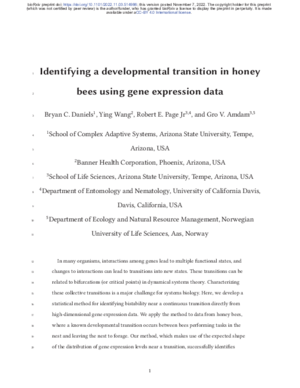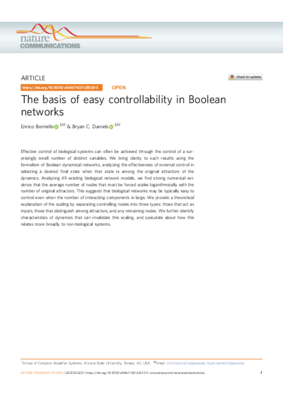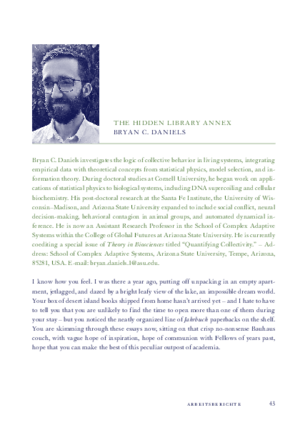
Bryan C. Daniels, Ph.D.
Quantitative Biology and Statistical Physics
Arizona State University, Tempe
Born in 1982 in Dayton, Ohio, USA
Studied Theoretical Physics at Cornell University
Fellowship
College for Life Sciences
Project
The Theory of Collective Decisions
In quantitative biology, a major challenge is understanding the core drivers of functional collective behavior. Examples include evasive movements of fish schools that foil predators, power structures supporting conflict management in monkey societies, gene interactions producing distinct cell types, and neurons combining information to make a decision. In each case, control lies with individual components, but adaptive consequences are a property of the aggregate.There is an urgent need to find theories of collective behavior that can operate in complex, data-rich environments. To tackle this problem, my research begins with biological data, uses model inference to discover predictive mechanisms, and then abstracts away from them to analyze collective function.
This project focuses specifically on binary decision-making, arguably the simplest form of collective computation. What forms of information sharing produce reliable decisions, and what mechanisms allow for adjusting and controlling these collective computations?
We are starting to see commonalities in collective decision-making across multiple systems. For instance, fish schools collectively encode the risk of predators, dynamically changing to allow a startle decision to spread quickly during periods of high risk (by condensing the school into a smaller area), while avoiding false alarms during periods of low risk (by spreading out). Similarly, in neurons driving a decision in a macaque brain, we see evidence of regulation of the distance from a symmetry-breaking transition that creates the two decision states.
Intriguingly, these results suggest that collective decisions typically involve dynamically varying the distance from a point of aggregate instability. In this work, I seek to better understand how systems regulate their position relative to such instabilities. In this way, I aim to discover fundamental tradeoffs that underlie adaptation and the control of collective decisions.
Recommended Reading
Daniels, Bryan C., William S. Ryu, and Ilya Nemenman (2019). "Automated, predictive, and interpretable inference of Caenorhabditis elegans escape dynamics." PNAS 116, 15: 7226-7231.
Daniels, Bryan C., Jessica C. Flack, and David C. Krakauer (2017). "Dual coding theory explains biphasic collective computation in neural decision-making." Frontiers in Neuroscience 11: 313. doi:10.3389/fnins.2017.00313.
Daniels, Bryan C., David C. Krakauer, and Jessica C. Flack (2017). "Control of finite critical behaviour in a small-scale social system." Nature Communications 8, 14301. doi: 10.1038/ncomms14301.
Colloquium, 24.02.2020
Understanding the Collective Logic of Living Systems
In biology, functional behaviors are often the result of a complicated and bewildering tangle of relationships among individual components. For instance: Dozens of types of proteins can be involved in carrying a simple signal from the surface of a cell into its nucleus. Hundreds of fish in a school continuously change position and behavior, yet they have a rapid and repeatable group response when a predator is spotted. Thousands of neurons in a brain, with large diversity in response characteristics, can contribute to even the simplest decisions.
How do these systems work? We could start by hypothesizing uniform populations with simple preset interactions. This gives some theoretical insights - but we know that the full story must be more complicated. How do systems retain their functionality given large diversity and changing composition? Is real-time adaptation required by individuals in order to get the collective behavior right? How is this controlled?
I will describe our recent efforts to infer mechanisms of collective functionality directly from data, which is beginning to give insights into such questions. I will draw from work on behavioral spreading in a monkey society and schools of fish, perceptual decision-making in cortical neurons, and the stereotyped motion of worms being zapped with lasers.
Publications from the Fellow Library
Daniels, Bryan C. (Singapore, 2023)
Daniels, Bryan C. (Cold Spring Habor, 2022)
Identifying a developmental transition in honey bees using gene expression data
Daniels, Bryan C. (London, 2021)
The basis of easy controllability in Boolean networks
Daniels, Bryan C. ([S.l.], 2021)
Subcritical escape waves in schooling fish
Daniels, Bryan C. (Lausanne, 2017)
Dual coding theory explains biphasic collective computation in neural decision-making
Daniels, Bryan C. ([London], 2017)
Control of finite critical behaviour in a small-scale social system



